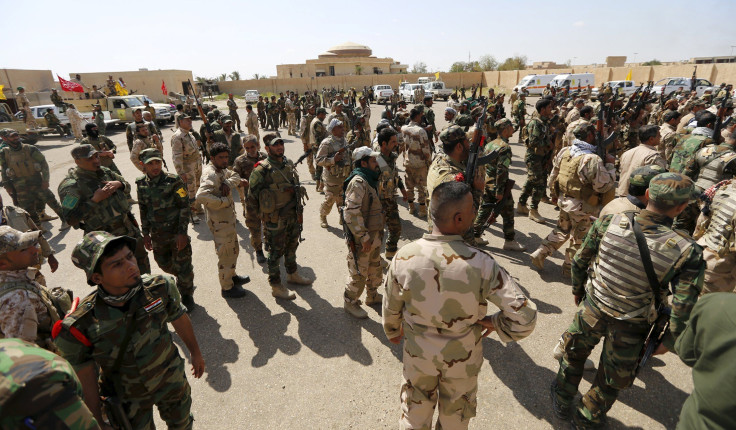Iraqi Volunteers Fighting For Tikrit Say The Army Is Nowhere To Be Found

SAMARRA, Iraq -- Dozens of pickup trucks pulled into a gravel parking lot in this central Iraqi city on Thursday, and unloaded teams of armed men. Moving under the blades of helicopters that had just landed in the lot, the men moved into a compound where they would sleep before heading back to the front lines in the morning. The “brothers,” as they called each other, were members of an Iraqi volunteer militia fighting the Islamic State group in Tikrit, 40 miles (60 kilometers) to the north. And, they said, they were doing so largely by themselves, without the help of the regular Iraqi Army that, according to the U.S., is leading the fight to retake Tikrit.
That battle has lasted, on and off, for more than a month, and on Thursday a major push was supposed to begin, helped by the Iraqi and coalition airstrikes that began Wednesday night. But the assault has been pushed back to Friday, amid disagreements between the various components of the forces attacking the Islamic State group.
The group, also known as ISIS or ISIL, still controls about 40 percent of Tikrit, a key junction on the road from Baghdad to Mosul, the second-biggest Iraqi city. While there are some Iraqi special forces in the battlefield, the men in Samarra said it feels like there is no longer an official Iraqi army. "It just doesn't exist. It is only people like us fighting now," said Rian al Khaldany, a member of Hashd al Shabi, an umbrella volunteer militia made up of groups of Shiites, Sunnis and even some men from Iraq’s Christian minority, like al Khaldany.
The Iraqi Army, the fighters said, is no longer a functioning force here. The government in Baghdad provides the militias with some funding and arms, but not coordination: The forces battling ISIS largely command themselves. Hashd al Shabi, also known as the Popular Mobilization Committee, controls its fight in Tikrit from a command center in Samarra, a compound with several buildings, each one dedicated to a separate militia. The various factions of Hashd al Shabi play a crucial role in the fight against ISIS, but don’t always do so together. The difficult relationship between the factions within Hashd al Shabi is representative of what the fight against ISIS looks like throughout this area of central Iraq, a two-hour drive north from Baghdad.
A problem is that they respond to different masters: Some are funded from Iran, others by individual wealthy businessmen. For many of the Shiite battalions here, support comes directly from Iran’s Shiite government, in the form of cash and weapons.
And although major factions such as the Badr and Imam Ali militias officially identify themselves as operating under one umbrella, they each operate with different commanders and different strategies.
Despite what may appear as an obvious sectarian motive -- a largely Shiite coalition against Sunni ISIS -- the war here isn't about religion, the fighters say. But in order to get funding they need to "appeal to the religious nerve," as a member put it, to get money from their own sect. It’s the only way, they said, they can get the weapons and munitions needed to defeat the well-funded ISIS.
But the war isn't about propping up the Iraqi government, either. Fighters do not talk about nationalism as the motive pushing them to battle. The men say they aren't fighting for leaders in government, but rather themselves and their families.
Beyond the airstrikes, they are not getting help from the U.S. Officials from the State Department and the White House have said they are working directly with the Iraqi military to help in the fight against ISIS. But while there are several hundred Americans training and equipping the army’s elite forces, mostly in Anbar province to the west of here, the volunteer forces in Tikrit get no help from Washington.
But once the assault starts in earnest, defeating ISIS will be easier than it looks, the Hashd al Shabi fighters say. The real test will come after the militant group is gone. Iraq will be littered with weapons, the men say, all of them up for grabs in a country riven by deep divisions and rife with armed groups.
© Copyright IBTimes 2024. All rights reserved.




















